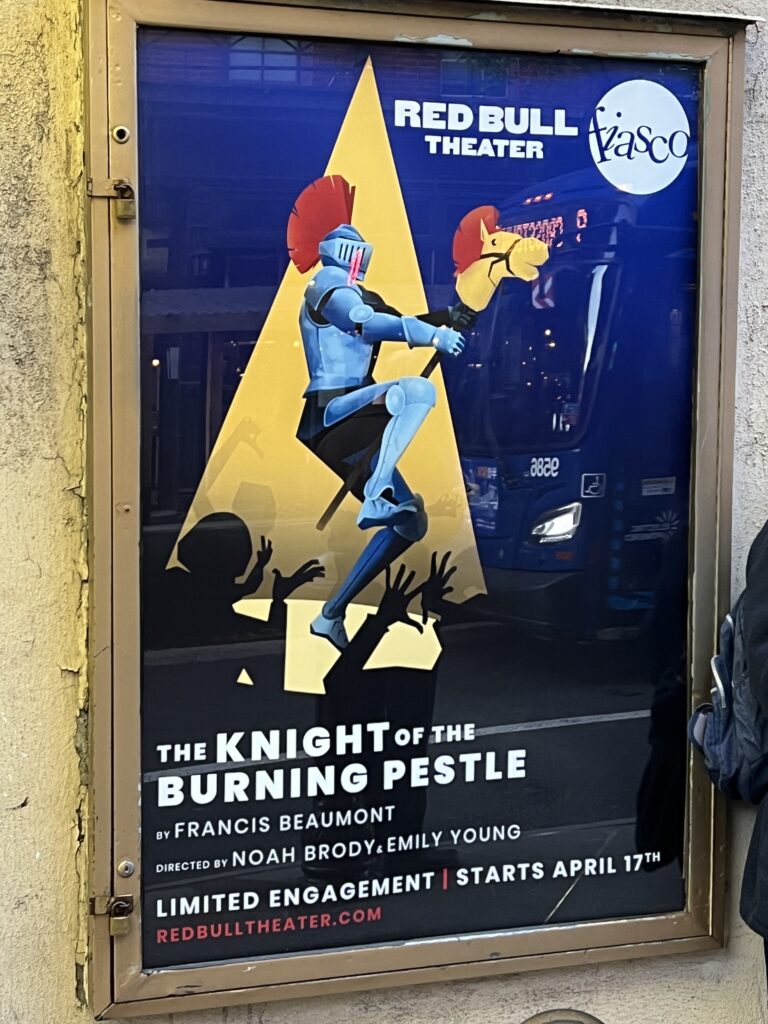I had never taught this one until two weeks ago, and I’d never seen it performed before last Thursday. My students and I had a great time working through this strange hybrid play / meta-play in class, but the collaboration between Red Bull and Fiasco, currently on stage in the West Village at the Lucille Lortel Theater on Christopher Street through May 13, was even better than we had hoped. It’s a very stage-y play, full of interruptions, jokes, improvisations, starting when a Citizen and his Wife disrupt the planned production of “The London Merchant” because they insist that they will see a Grocer on stage, and “he shall do admirable things.” Give the people what they want!

I’m in the middle of my late-spring theaterfest, and I’ve got three blog-reviews in progress – for The Wife of Willesden at BAM on 4/13, Pestle on 4/20, and Fat Ham on 4/22 – so I’ll keep it short. Three quick points –
First, I was blown away by the quality and collaborative closeness of the ten person cast. Most of the players are part of Fiasco Theater, who staged Pestle in collaboration with Red Bull. Many of the Fiasco’s trained at Trinity Rep in Providence. I’ve been a fan of Trinity Rep and its alums for many years, since I played a bit part (Charles the wrestler) in a semi-pro production of As You Like It in 1994 with a headline case of Trinity Rep actors. Some members of Fiasco currently work with NYU’s Gallatin School, so they continue to do academic outreach. What I loved most about these ten actors was their obvious joy in working together. Stand outs include Ben Steinfeld as Old Merrythought, Paco Tolson as Rafe, and (especially!) Royer Bockus as Michael, Rafe’s horse, and, in the interludes, a soulful country singer. It’s rare to see such an evenly matched company – though I think I have felt the same way about previous Fiasco productions I’ve seen over the years, from a great sea-shanty-framed Twelfth Night to Measure for Measure and Two Gentlemen of Verona.
Talking with my students today, we compared Pestle to the Arden of Faversham we saw a month earlier in the same West Village theater. Arden is a tragedy, which tends to spotlight its central figures, but we all were struck by the contrast between the melodramatic presentation of husband-killer Alice and the easy sympathy across the cast of Pestle. We had talked in class about the contrast between Jasper, the apprentice hero of the city comedy main plot who conspires to marry his master’s daughter, and Rafe, the grocer’s apprentice who’s called up out of the audience to represent the common citizen. Jasper beats Rafe early in the play, but the sense of conflict or rivalry that I see as a literary critic wasn’t powerfully visible on stage. In this production, Rafe shares his subplot with the Citizen, who leads the fake armies of Act 4, and his Wife, who dresses as the exotic Princess Pampiona, who falls in love with Rafe in Act 3. But there always seemed to be plenty of space and plenty of shared community as the play developed.
In Beaumont’s play, each of the five acts gets divided by short interludes, which usually consist of the Citizen and his Wife insisting that what the play needs is more Rafe. The interludes as Fiasco staged them were less combative than in the original text, but also more gloriously musical. Picking up to some extent from the exuberance of Steinfeld’s Old Merrythought, these musical interludes resembled blue-grass or country folk music, perhaps picking up on the “common man” claims that the Citizen and his Wife trumpeted from the wings.
Music, like physical comedy, can be hard to represent in a playbook, and it’s certainly true that my students found Pestle much more fun on stage than in the classroom. I felt fortunate to get to see this rarity, which I’d never seen performed before. I still wonder how much Beaumont might have known about Don Quixote, which had been published in Spain a few years before his Rafe mistook an inn for a castle – though the first English translation did not appear until 1612, after the staging of The Knight of the Burning Pestle. But whatever the network of influence – it’s a fun, lively, joyful play.
Downtown until May 13th!